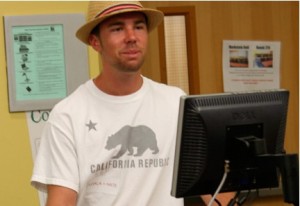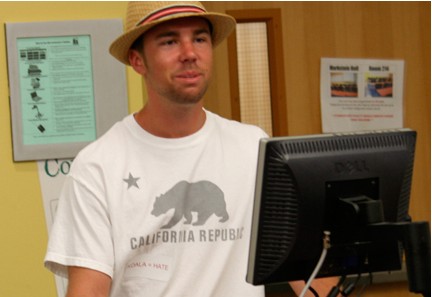
The Cougar Chronicle
Matt Weaver, the ex-CSUSM junior who pleaded guilty last spring to stealing 745 students’ passwords in an effort to rig the 2012 ASI election, was sentenced July 15 to one year in prison, according to the U.S. Attorney’s Office.
The 22-year-old Huntington Beach resident had been running for the office of ASI president and was caught in the act using other students’ logins and passwords to vote for himself and some friends more than 630 times. He obtained the login credentials by attaching a series of keylogging devices to desktop computers in the campus’s computer labs. He also used the stolen identities to read other students’ emails and log in to their Facebook pages.
U.S. District Judge Larry A. Burns was concerned about Weaver’s election fraud efforts, but was even more troubled by the fact that Weaver used the stolen student information, even after his arrest, to try and frame other CSUSM students for the election fraud, even sending anonymous emails to local newspapers to accuse fellow candidates of committing election fraud.
Falsely blaming others when Weaver knew he was responsible for the crime is “the phenomenal misjudgment I just can’t get around,” the judge told Weaver. “That’s what bothers me more than the original rigging” of the election, according to a press release from the U.S. Attorney’s Office.
Judge Burns noted that the original crime might have been perceived as less egregious – even a youthful prank – except for the cover up. “He’s on fire for this crime and then he pours gasoline on it” with similar bad behavior, the judge said.
“Weaver ran roughshod over the privacy rights of hundreds of people so that he could indulge his vanity,” said U.S. Attorney Laura Duffy, in a statement. “If privacy is to mean anything in a digital age, it has to be protected. A 12-month sentence adequately warns men and women like Weaver that they cannot hide from the consequences of their actions behind youth or privilege. Everyone’s rights matter – not just theirs.”
Weaver cast many of the votes from a computer located on campus. According to court records, Weaver was exposed during the final hour of the student body election, when network administrators noticed unusual voting activity associated with a computer in Academic Hall 204. The administrators were able to determine that the user, later identified as Weaver, was cutting and pasting student usernames and passwords from an Excel spreadsheet into the VOTE system and then cast those students’ votes.
Shortly after the election closed at 5 p.m., CSUSM network administrators asked CSUSM police officer Brian McCauley to go to the suspicious computer in Academic Hall 204. There, Officer McCauley found Weaver sitting at the computer and noted that Weaver was using the only computer in the lab with a screen not
visible to the rest of the room.
Weaver, after seeing McCauley, who was in uniform, began shutting down the campus computer. McCauley and Weaver then had a short conversation, during which Weaver said he was working on a school project, but refused to provide details. McCauley then arrested Weaver and seized his bag, which contained six keyloggers
as well as other evidence of the crimes.
In a sentencing memorandum, prosecutors said Weaver was fully aware of the serious ramifications of his crime and was motivated by ego and greed. In fact, a search of Weaver’s laptop showed queries like “jail time for keylogger” and “how to rig an election.”
“He wanted power through the $300,000 budget and respect through his status as CSUSM’s student body president. But he did not want to earn it, he wanted to steal it,” prosecutor Sabrina Feve wrote in a sentencing memorandum.
“Weaver determinedly and repeatedly spied on his classmates, stole their passwords, read their secrets, and usurped their votes – and he did it with his eyes wide open,” the memorandum said. “Weaver actually researched the legality of his scheme beforehand…and then, when he knew it was completely illegal, he
researched how to blame someone else.”


